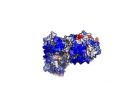(Press-News.org) An international team of scientists has discovered what amounts to a molecular reset button for our internal body clock. Their findings reveal a potential target to treat a range of disorders, from sleep disturbances to other behavioral, cognitive, and metabolic abnormalities, commonly associated with jet lag, shift work and exposure to light at night, as well as with neuropsychiatric conditions such as depression and autism.
In a study published online April 27 in Nature Neuroscience, the authors, led by researchers at McGill and Concordia universities in Montreal, report that the body's clock is reset when a phosphate combines with a key protein in the brain. This process, known as phosphorylation, is triggered by light. In effect, light stimulates the synthesis of specific proteins called Period proteins that play a pivotal role in clock resetting, thereby synchronizing the clock's rhythm with daily environmental cycles.
Shedding light on circadian rhythms
"This study is the first to reveal a mechanism that explains how light regulates protein synthesis in the brain, and how this affects the function of the circadian clock," says senior author Nahum Sonenberg, a professor in McGill's Department of Biochemistry.
In order to study the brain clock's mechanism, the researchers mutated the protein known as eIF4E in the brain of a lab mouse so that it could not be phosphorylated. Since all mammals have similar brain clocks, experiments with the mice give an idea of what would happen if the function of this protein were blocked in humans.
Running against the clock
The mice were housed in cages equipped with running wheels. By recording and analyzing the animals' running activity, the scientists were able to study the rhythms of the circadian clock in the mutant mice.
The upshot: the clock of mutant mice responded less efficiently than normal mice to the resetting effect of light. The mutants were unable to synchronize their body clocks to a series of challenging light/dark cycles - for example, 10.5 hours of light followed by 10.5 hours of dark, instead of the 12-hour cycles to which laboratory mice are usually exposed.
"While we can't predict a timeline for these findings to be translated into clinical use, our study opens a new window to manipulate the functions of the circadian clock," says Ruifeng Cao, a postdoctoral fellow in Dr. Sonenberg's research group and lead author of the study.
For co-author Shimon Amir, professor in Concordia's Department of Psychology, the research could open a path to target the problem at its very source. "Disruption of the circadian rhythm is sometimes unavoidable but it can lead to serious consequences. This research is really about the importance of the circadian rhythm to our general well-being. We've taken an important step towards being able to reset our internal clocks -- and improve the health of thousands as a result."
INFORMATION:
Partners in research:
Funding for this study was provided by the Canadian Institutes of Health Research, the U.S. National Institutes of Health, the Howard Hughes Medical Institute, the Fonds de recherche du Québec-Santé and a Banting Postdoctoral Fellowship.
"Light-regulated translational control of circadian behavior by eIF4E phosphorylation," Ruifeng Cao et al, Nature Neuroscience, published online April 27, 2015.
http://dx.doi.org/10.1038/nn.4010
Bethesda, MD (April 27, 2015) -- Patients are always interested in understanding what they should eat and how it will impact their health. Physicians are just as interested in advancing their understanding of the major health effects of foods and food-related diseases. To satisfy this need, the editors of Gastroenterology, the official journal of the American Gastroenterological Association, are pleased to announce the publication of this year's highly anticipated special 13th issue on food, the immune system and the gastrointestinal tract.
"This special issue provides ...
DARIEN, IL - A new study of night shift workers suggests that overnight occupational and cognitive impairment is more strongly correlated to insomnia than it is to sleepiness.
Results show that night shift workers classified as alert insomniacs had the highest level of impairment in work productivity and cognitive function, which was significantly worse than controls. This occupational impairment was more severe in alert insomniacs than in insomniacs with excessive sleepiness. The study also found that alert insomniacs reported significantly greater fatigue than sleepy ...
New research out of Queen's University shows early benefits from the human papillomavirus (HPV) vaccine in young girls.
The HPV vaccine, which protects against four types of HPV shown to cause cervical cancer and anogenital warts, is offered free through school-based programs to young girls across Canada. Despite the fact the vaccine is free, vaccine rates are lower than expected a number of regions, in part because parents perceive their daughter's level of sexual activity as low at young ages.
"We observed a large and significant reduction in cervical dysplasia, a precursor ...
The peak time for seeking information on topics related to HIV, such as prevention and testing, is at the beginning of the week, while risky sexual behaviors tend to increase on the weekends, according to a new analysis by researchers at the Johns Hopkins Bloomberg School of Public Health and the Monday Campaigns.
The researchers also found that among people living with HIV, adherence to antiretroviral therapy (ART) is slightly lower on weekends, and evidence indicates an association between breaks in daily routine and sporadic interruptions to ART adherence. The researchers ...
Scientists from the Gladstone Institutes have discovered a way to prevent the development of multiple sclerosis (MS) in mice. Using a drug that blocks the production of a certain type of immune cell linked to inflammation and autoimmunity, the researchers successfully protected against the onset of MS in an animal model of the disease. The scientists say the next step is to test this strategy using other autoimmune disorders.
"We are very excited about these findings," says Eric Verdin, MD, a senior investigator at Gladstone and co-senior author on the study. "In light ...
Stroke is a frequent and dreaded complication of atrial fibrillation. But predicting which of the estimated six million Americans with a-fib are at highest risk has long challenged physicians weighing stroke risk against the serious side effects posed by lifelong therapy with warfarin and other blood thinners.
Now researchers from Johns Hopkins performing sophisticated motion studies of heart MRI scans have found that specific altered function in the left atrium -- one of the heart's four chambers -- may signal stroke risk in those with a-fib and, possibly, those without ...
Olive oil is universally considered a much healthier alternative to meat fat. Plant-derived oils (such as olive oil, canola oil, and vegetable oil) largely consist of unsaturated fatty acids, whereas animal fat is richer in the saturated ones. After a typical meal, carbohydrates are the primary source of energy production by the heart. Under fasting conditions, however, free fatty acids become the major energy producer. Saturated fat in a diet is known to be detrimental to heart health, but its impact on the cardiac muscle has been studied only recently.
Interestingly, ...
Researchers from the Institute of Biotechnology and Biomedicine at the Universitat Autònoma de Barcelona (IBB-UAB) and from the University of Warsaw have developed a new computational method called AGGRESCAN3D which will allow studying in 3D the structure of folded globular proteins and substantially improve the prediction of any propensity for forming toxic protein aggregates. With this new algorithm proteins can also be modelled to study the pathogenic effects of the aggregation or redesign them for therapeutic means.
Current knowledge of the molecular bases of ...
This news release is available in German.
At first glance, there is not the slightest doubt: to us, the universe looks three dimensional. But one of the most fruitful theories of theoretical physics in the last two decades is challenging this assumption. The "holographic principle" asserts that a mathematical description of the universe actually requires one fewer dimension than it seems. What we perceive as three dimensional may just be the image of two dimensional processes on a huge cosmic horizon.
Up until now, this principle has only been studied in exotic ...
Hot vents on the seabed could have spontaneously produced the organic molecules necessary for life, according to new research by UCL chemists. The study shows how the surfaces of mineral particles inside hydrothermal vents have similar chemical properties to enzymes, the biological molecules that govern chemical reactions in living organisms. This means that vents are able to create simple carbon-based molecules, such as methanol and formic acid, out of the dissolved CO2 in the water.
The discovery, published in the journal Chemical Communications, explains how some of ...

